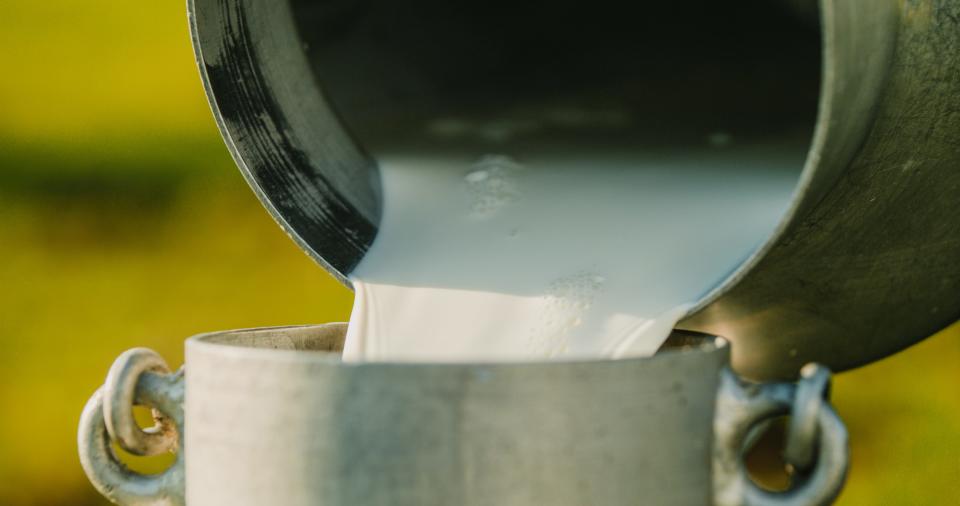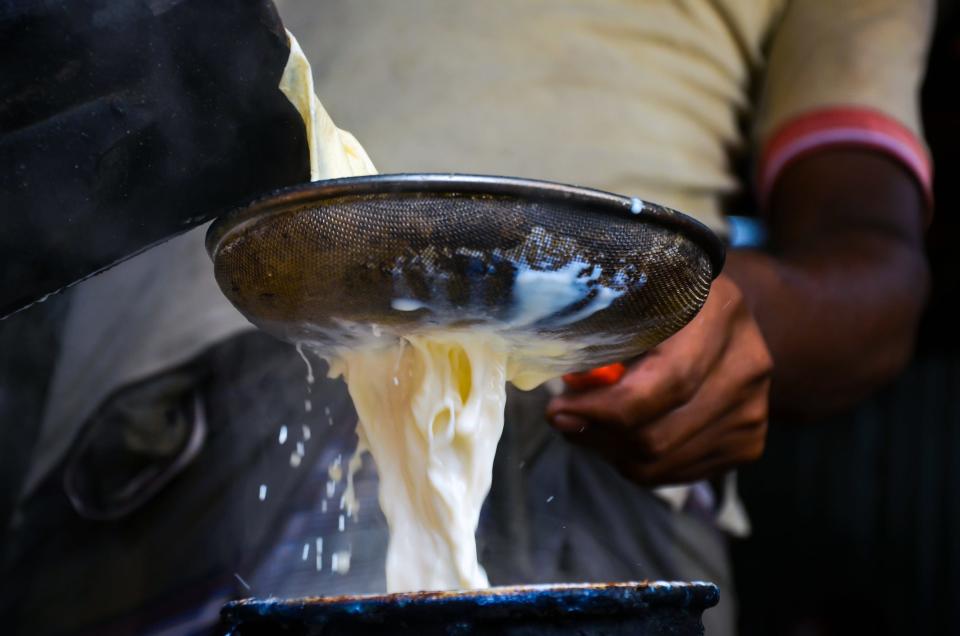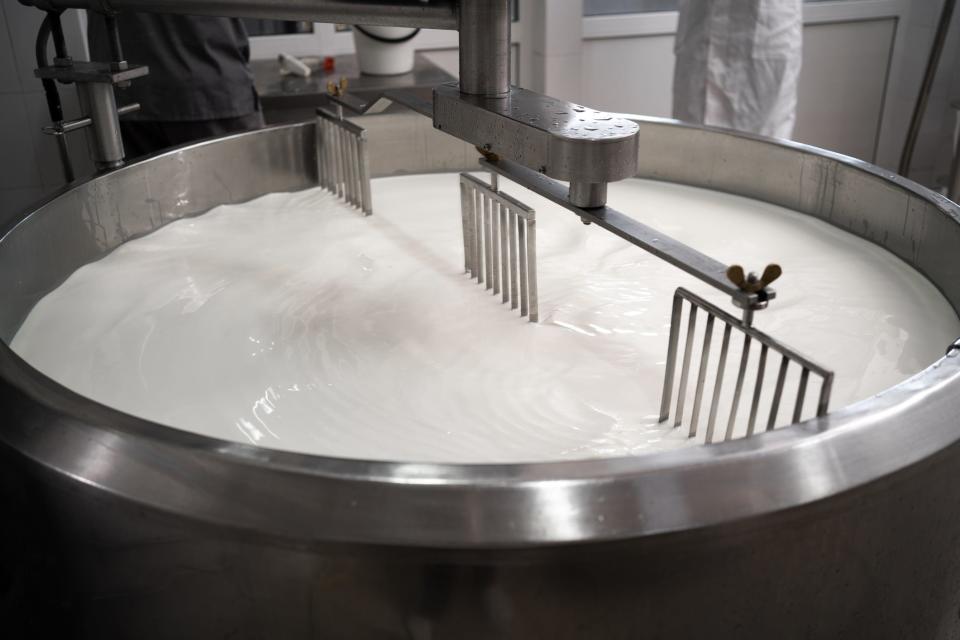Seriously, don't drink the raw milk: Social media doubles down despite bird flu outbreak
No, seriously, don't drink that raw milk, despite what social media may continue to tell you.
Communities online have continued to push the rising trend of seeking out raw milk for consumption in the weeks following an update on the spread of bird flu in the U.S. earlier this month.
In a press conference on May 1, the CDC, FDA and USDA revealed that recent testing on commercial dairy products detected remnants of the H5N1 bird flu virus in one in five samples. However, none contained the live virus that could sicken people and officials said testing reaffirmed that pasteurization kills the bird flu virus, making milk safe to consume.
Even so, anti-pasteurization dairy advocates have continued their crusade online, with some saying they have begun to intentionally seek out milk contaminated with H5N1 to drink to "build up" what they believe will be a "tolerance" or "immunity" to the virus.
This continued insistence on consuming raw dairy, which was already a growing trend and concern prior to the avian flu outbreak, led the CDC to issue additional warnings last week, saying "high levels of A(H5N1) virus have been found in unpasteurized (“raw”) milk" and advising that the CDC and FDA "recommend against the consumption of raw milk or raw milk products."
Bird flu outbreak: Don't drink that raw milk, no matter what social media tells you
Raw milk fans, influencers ignore FDA, CDC warnings
Raw milk has also made headlines separate from bird flu in recent months, with local health agencies putting out warnings about specific products. In Pennsylvania, officials advised those who purchased raw milk from April through early May to discard it due to Campylobacter contamination, while Washington saw an E. Colio outbreak linked to raw milk earlier this year.
Even so, those who believe the science-backed practice pasteurization, which has been used for over 100 years, is unnecessary or even harmful have continued to question such warnings, with advocacy groups like "A Campaign for Real Milk" and the "Raw Milk Institute" putting out responses claiming that illness and deaths linked to the consumption of raw milk, as well as research into the presence of H5N1 in milk, is all a "lie" or inaccurate.
The spread of these claims has led experts to express concern for consumers who may be exposed to or convinced by these messages, as the consumption of raw milk can be especially dangerous for the elderly, children, pregnant people and those with compromised immune systems.
Here's what to know about pasteurization and what it does to the products we consume:

Chicken owners: Here's how to protect your flock from bird flu outbreaks
What is pasteurization and why is it important?
Pasteurization is the process of heating milk to a high enough temperature for a long enough time to kill harmful germs, according to the CDC.
The process of pasteurization became routine in the commercial milk supply in the U.S. in the 1920s and was widespread by the 1950s. As a result, illnesses commonly spread via milk became less prevalent.
While misinformation about the process has led some to believe that pasteurized milk is less nutritious or better for people with lactose intolerance, pasteurization does not significantly compromise the nutritional value or content of milk. In some states, selling raw milk directly to a consumer is illegal.

What can happen if you consume raw dairy?
Raw milk can carry a host of harmful bacteria, including:
? Salmonella
? E. coli
? Listeria monocytogenes
? Campylobacter
? Coxiella burnetii
? Cryptosporidium
? Yersinia enterocolitica
? Staphylococcus aureus
? Other foodborne illness-causing bacteria

The presence of these can cause a variety of health issues and ailments, including:
? Listeriosis
? Typhoid fever
? Tuberculosis
? Diphtheria
? Q fever
?Brucellosis
? Food poisoning
? Miscarriage
? Guillain-Barre syndrome
? Hemolytic uremic syndrome
? Reactive arthritis
? Chronic inflammatory conditions
? Death
Why are some social media users still pushing unpasteurized milk and dairy?
Fringe ideas of health, wellness and nutrition have become easily widespread and somewhat popular with social media.
On TikTok, many homesteading, "tradwife," "all-natural" and other self-proclaimed wellness influencers push the idea of raw milk, presenting the idea that less intervention of any kind in their food is better.
Some also claim that they have been drinking it for years without illness, that they believe drinking it has cured their lactose intolerance and other health conditions, or that the raw milk contains vital nutrients and ingredients that are done away with by pasteurization.
These claims have all long since been debunked, according to agencies including the FDA, USDA and CDC.
Some big (and controversial) names including Gwyneth Paltrow and Robert F. Kennedy Jr. have even publicly touted their consumption of raw milk, pushing the misinformation mentioned above. While some cite an overall distrust of government regulations involving food, some appear to believe they are helping others improve their health or are prone to sharing anecdotal evidence.
Comments under these videos include many justifications for drinking raw milk, from "if government says it's bad for you, there's hidden health benefits they don't want you to know," to "would it help with gut health that's been wrecked by antibiotics?" to sharing phone numbers and information on where to buy it under the table.
Others also have products they're looking to sell, whether that's the milk itself or some form of nutrition/wellness/diet plan or supplement.
Some established names, such as famous author and online creator John Green, have also taken to social media platforms like TikTok to tackle these claims head-on, with many making direct responses to popular videos promoting the consumption of raw milk.
While others, like self-identified dieticians, doctors and scientists have brought their expertise to social apps in an attempt to quell the trend, though it is a common issue for users to discern who is truly qualified and who is not in such posts.
Even without concerns about bird flu, the consumption of raw milk is a well-documented risk that can and does lead to serious health consequences. The recent outbreak of H5N1 is simply another reason to ensure you are drinking properly treated milk and remaining vigilant when making decisions about food safety, experts say.
No matter how magical and all-healing users on social media claim raw milk to be, it is important to remember that science says differently.
This article originally appeared on USA TODAY: Raw milk might not be good for you, even if social media doubles down
